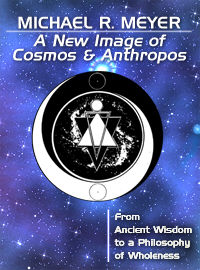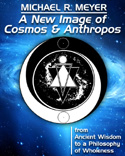
|

A New Image of Cosmos and Anthropos |

PREVIEW Part One
Toward a New Image
of Cosmos and Anthropos For modern aspirants, an authentic spiritual quest is a perilous path with many confusing crossroads and treacherous turns. One of the many turns ahead of today's sincere seeker leads to the realization that because we are living through an age featuring unprecedented problems, dangers and opportunities, one must face inquiries, crises and transformations unknown to previous generations of aspirants. Indeed, to be authentic, the aspirant's approach and transformative experiences must be to some degree unprecedented, fundamentally different than those encountered during previous centuries. Yet because the essential structure of the path of transformation is invariable, one often hears that the rules of spiritual living, like "ultimate Truth," never change. Do they, really? A related challenge facing today's aspirant concerns how he or she deals with both the glamorous claims made by representatives of the many particular religious, esoteric and spiritual traditions and the multi-cultural mosaics modern intellectuals have gleaned from various traditions. It is tempting to state that such a situation exists today because traditionalists upholding a singular truth and intellectuals promoting a synthetic approach hold mutually exclusive views regarding the nature and origin of spiritual knowledge. And indeed, many gurus and religious leaders tend to imply their particular tradition is intrinsically superior to all others; while it is vogue among scholars and intellectuals concerned with religious and new age studies to take an egalitarian approach, holding that all the many traditions are of equal value and that their best tenets and features somehow add up to the perennial philosophy. Both approaches, however, have something in common—both are past-oriented. A fundamental or traditional approach is past-oriented because it attempts to immortalize the seed-moment originating a particular tradition, which its true believers embrace as a final and certain revelation of Truth—an approach very attractive to people longing for a sense of security, righteousness and certainty in an unprecedented age of chaos and uncertainty. To many liberated thinkers, however, the concept of a perennial philosophy is highly appealing. On the surface, their approach may seem new, well-integrated and appropriate for an emergent global humanity. But such an approach actually isn't holistic, future-oriented or suited to the needs of a truly global age because it is founded on the false premise that the many local traditions—which in the past gave universal principles a particular and limited formulation adequate to meet the particular needs of a particular local culture during a particular phase of its life—cycle-add up to a timeless, universal philosophy. What actually confuses the issue is neither the glamorous claims of gurus and traditionalists nor the multi-cultural mosaics promoted by intellectuals and new age thinkers. The real cause of misunderstanding lies rather in a lack of knowledge regarding the one planetary source of spiritual Wisdom and how its many operative aspects are periodically released and given form and transformative power according to the cyclic rhythms and exigencies of human and planetary evolution. Since the last quarter of the 19th century, however, definite and persistent efforts have been made to shift our attention from the glamour of the many particular traditions to their planetary source. In all her writings, for instance, H. P. Blavatsky pointed to what she called the universal "Wisdom Religion," of which the many great spiritual traditions are partial reflections. Theosophia (divine Wisdom) is a synonym Blavatsky often used in place of Wisdom Religion, which she defined in The Theosophical Glossary as "the substratum and basis of all world-religions and philosophies." And Blavatsky carefully advised her students to observe the distinction between theosophia (the Source or substratum as a whole) and the particular teachings (based on an aspect of theosophia) she and her teachers formulated and promulgated.
Read more and purchase the Kindle eBook at Amazon.com
Don't Have a Kindle? No problem! Download a free Kindle app for PC, MAC, Nook, iPad, iPhone, Tablets and Android devices at Amazon.com Text Copyright © 1995 by Michael R. Meyer All rights reserved  mail@khaldea.com Web design and all data, text and graphics appearing on this site are protected by US and International Copyright and are not to be reproduced, distributed, circulated, offered for sale, or given away, in any form, by any means, electronic or conventional. Unless otherwise noted, all text, data and graphics appearing on this site are copyright © 2000-2010 by Michael R. Meyer. All Rights Reserved. See Notices for copyright statement, conditions of use, and disclaimer. |About|Calendar|Ephemeris| |Charts|Art Gallery|Library|Resources| |Shop|Links|Rudhyar Archival Project|Help| Web design and programming for this entire site copyright © 2000-2004 by Michael R. Meyer. |
